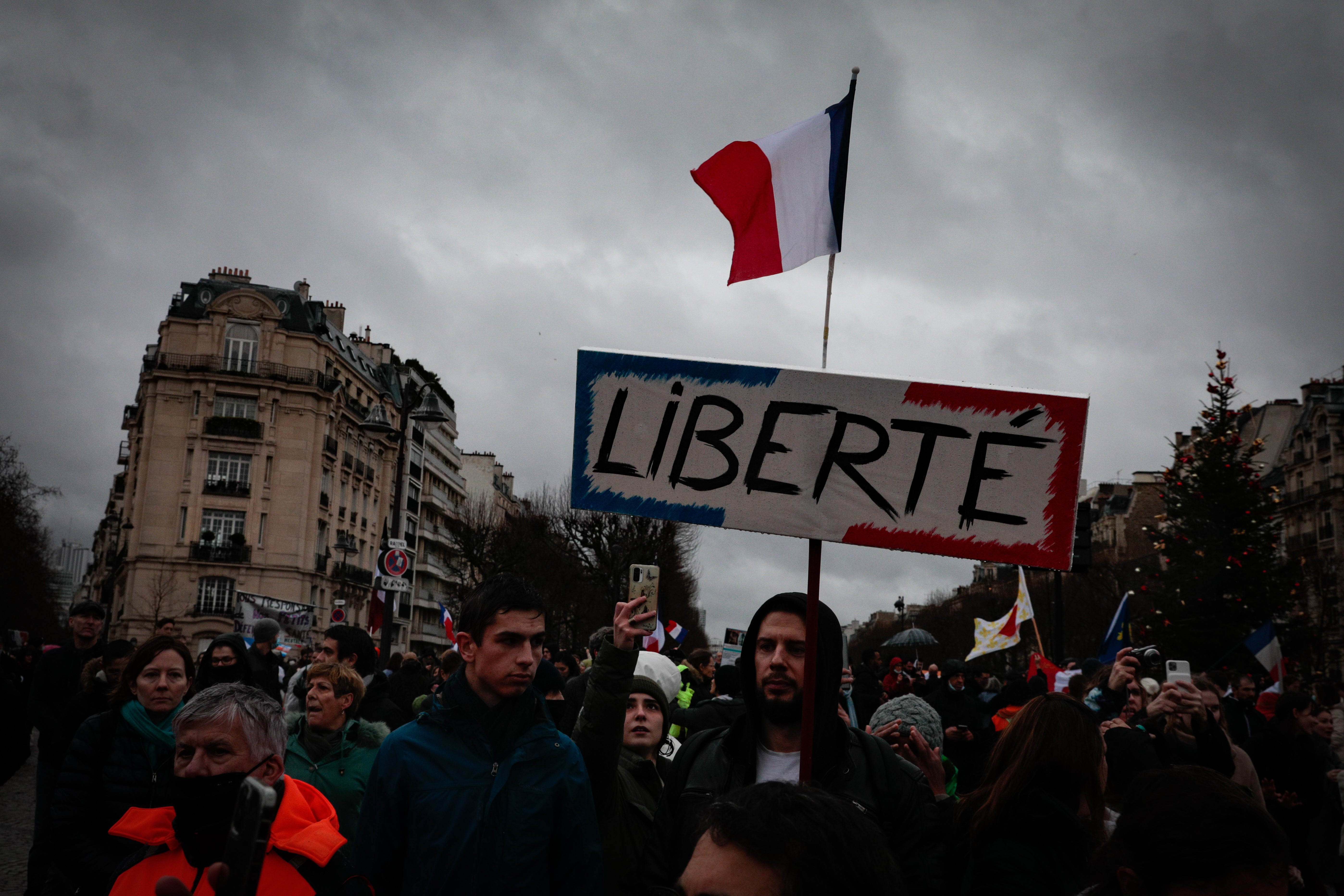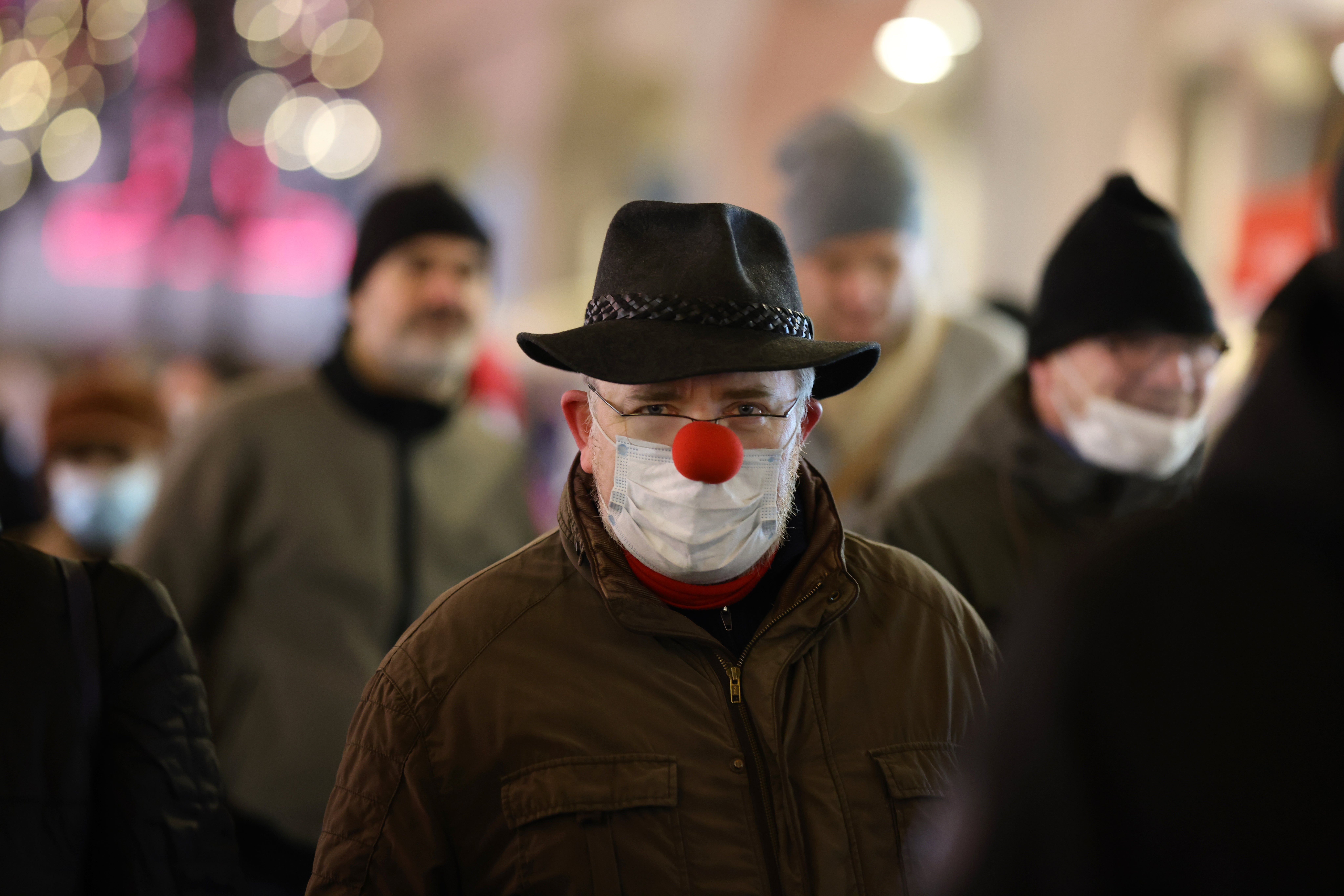‘Unparalleled threats’: Anti-vaxxer movement threatens a new wave of extremism
As police foil a string of anti-vaxxer plots across Europe, there are growing fears that radicalisation could lead to violence, reports Ahmed Aboudouh
Your support helps us to tell the story
From reproductive rights to climate change to Big Tech, The Independent is on the ground when the story is developing. Whether it's investigating the financials of Elon Musk's pro-Trump PAC or producing our latest documentary, 'The A Word', which shines a light on the American women fighting for reproductive rights, we know how important it is to parse out the facts from the messaging.
At such a critical moment in US history, we need reporters on the ground. Your donation allows us to keep sending journalists to speak to both sides of the story.
The Independent is trusted by Americans across the entire political spectrum. And unlike many other quality news outlets, we choose not to lock Americans out of our reporting and analysis with paywalls. We believe quality journalism should be available to everyone, paid for by those who can afford it.
Your support makes all the difference.In Germany, security agencies foiled a plot to assassinate Michael Kretschmer, the pro-vaccine governor of Saxony. In Italy, Antonella Viola, a prominent immunology expert, was given protection after receiving a bullet and a letter threatening her life.
In the Netherlands, senior politician Sigrid Kaag’s home was attacked by an anti-vaxxer carrying a flaming torch. And in the UK, the militant anti-vaccine group Alpha Men Assemble (AMA) is reportedly plotting to target the police, vaccination centres and schools.
Intelligence agencies fear the increasing threats and violent marches could start a new wave of extremism across Europe as mandatory vaccines and the so-called “Covid passes” take effect. The most extreme of anti-vaxxers could present a new danger, according to experts.
“The risk is that if the movement radicalises further, there may also be a risk of more coordinated violence, including terrorism,” says Peter Neumann, professor of security studies at King’s College London and founder of the International Centre for the Study of Radicalisation (ICSR).
Conspiracy theories, disseminated on social media, over the effects of Covid jabs bolstered the resolve of sceptics to refuse the vaccine. Experts say making vaccination mandatory could be a life or death matter for many of them.

“If one sincerely believes vaccines are dangerous and that the vaccination programme is a conspiracy by shadowy elites aimed at depopulation, these measures will be perceived as extremely threatening,” says Jakob Guhl, manager at the Institute for Strategic Dialogue (ISD), a think tank focused on tackling polarisation, extremism and disinformation.
“If a global genocide is imminent, violence may be seen as a legitimate response. But while this risk is real, policy-makers cannot be held hostage by threats of violence,” he adds.
Intelligence officials still have major concerns over jihadist and far-right terrorist threats, which saw a relative decrease over the past two years compared with major attacks across Europe in the heyday of the Islamic State (Isis).
MI5 said in September, a total of 32 late-stage terror plots had been foiled in the UK since 2017, the majority among them were Jihadist-linked, but far-right extremists planned a growing number of attacks.
The anti-vaxxers fast radicalisation presents security officials in Europe with an additional puzzle to solve. Anti-vaxxers lack ideological cohesion since they speak for a hodgepodge of activists who distrust the authorities. For example, the movement does not have a united leadership and merely seeks to resist the imposed health measure without actively plotting to change society or people’s way of life.
There may be a risk of more coordinated violence by the movement, including terrorism
“Anti-vaccine sentiment is a cross-ideological issue. You can also see conspiracy and Covid-related narratives in the groups that do not have a clear ideological leaning or support a blended or blurry ideological perspective to gain more followers,” says Dr Jessica White, a terrorism and conflict research fellow at the Royal United Services Institute (RUSI) in London.
“But anti-vaccination and Covid-related sentiment does not formulate an ideology in and of itself,” she adds.
Covid deniers and the anti-vaxxers are increasingly seen by far-right movements and political parties as a massive pool of fresh activists and potential followers. Conspiracy theories on social media, the search for identity and the anti-vaxxer movements’ reach across Europe, means it could become a formidable force, able to wield violence to disrupt public life. Their demands could be exploited by far-right politicians who see the pandemic as a booster to their cause.
“The anti-lockdown movement is much larger, reaches into the mainstream of society. Obviously, not everyone who is anti-vaxxer is necessarily an extremist or terrorist. But their potential to destabilise societies, either through politics or violence, is much greater,” Neumann says.
So far, mass protests and sometimes violent marches remain the tool for mainstream anti-vaxxer activists. More than 100,000 rallied in France recently against government restrictions after the country’s president Emmanuel Macron said he wants to “piss off” the unvaccinated by making it mandatory to get the jab to be able to visit restaurants, bars, theatres or sports events.
Protesters replied to Mr Macron by chanting, “ We will piss you off.”

Protesters rallied against similar measurements in Germany, Italy and Austria on Saturday, where police reported several arrests. Of course, the vast majority of such protesters do not present any long-term risk.
And despite the targeted plots and clashes in the marches, experts believe violence that would cause mass casualties among innocent civilians – one of the Islamist jihadists’ strategy pillars – is not yet on the anti-vaxxers and anti-lockdown movements’ agenda.
“So far, there is also little indication that there would be any support within the anti-lockdown movement for mass-casualty attacks against civilians,” Guhl says.
“For the majority, this sentiment does not in and of itself lead to violence – it is often the linking of it to other extremist points of view that manifest in violence at the extreme end of the spectrum,” White says.
The group has not claimed their beliefs are superior to the others. The idea of the selected elite minority common in both the far-right and jihadist extremism based on ethnicity, religion, colour, or ideology was not yet evident in the chants and slogans of the anti-lockdown marches.
However, the fast spread of the Omicron variant and the rise in Covid cases in most European countries, and the strict lockdown measures that come with it, carry the risk of deepening the social divide over the anti-lockdown narratives.
Many of those frustrated with government policies could turn to violence by targeting officials who oversee them.
“The volume of people involved, and the intensity of threats, especially against mayors and local officials, is unparalleled,” Neumann says.

Join our commenting forum
Join thought-provoking conversations, follow other Independent readers and see their replies
Comments